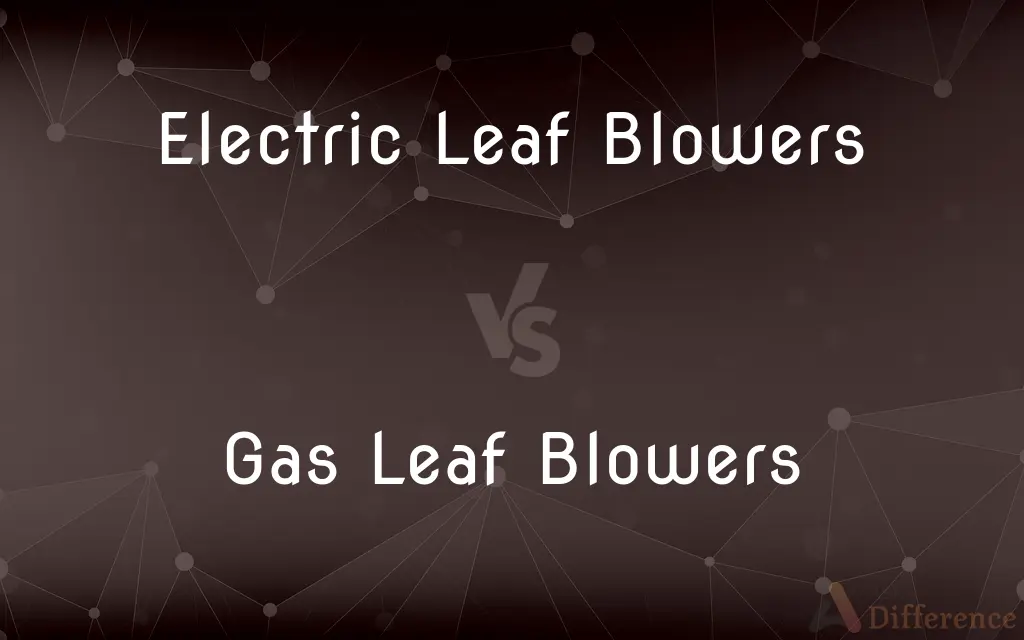Electric Leaf Blowers vs. Gas Leaf Blowers — What's the Difference?
By Tayyaba Rehman & Urooj Arif — Published on February 15, 2024
Electric Leaf Blowers are powered by electricity and are quieter and lighter. Gas Leaf Blowers are powered by gasoline, offering more power and mobility but are heavier and noisier.

Difference Between Electric Leaf Blowers and Gas Leaf Blowers
Table of Contents
ADVERTISEMENT
Key Differences
Electric Leaf Blowers and Gas Leaf Blowers serve the same purpose of clearing leaves and debris but differ significantly in their operation, maintenance, and performance. Electric Leaf Blowers can be either corded, limiting mobility but providing continuous power, or battery-operated, offering more freedom but with limited run time. They are generally lighter, quieter, and easier to start compared to their gas counterparts, making them suitable for smaller yards and noise-sensitive areas.
Gas Leaf Blowers, on the other hand, are known for their power and mobility. They do not have the limitation of a power cord or battery life, making them ideal for larger properties. However, they require a mixture of gas and oil to operate (unless it's a four-stroke engine), need regular maintenance, and emit fumes, making them less environmentally friendly. They also tend to be heavier and noisier, which could be a consideration for users and neighborhoods.
The choice between electric and gas leaf blowers often comes down to the size of the area to be maintained and the user's preference for convenience versus power. Electric models are favored for light-duty work within a small to medium-sized area or where noise is a concern. In contrast, gas models are preferred for their versatility and superior power, suitable for heavy-duty tasks and larger areas without access to electrical outlets.
While electric blowers are catching up in terms of power with advancements in battery technology, gas blowers still hold the edge for the most demanding tasks. Moreover, the maintenance aspect is considerably different; electric blowers require minimal maintenance, while gas blowers need regular engine checks, fuel refills, and proper storage during off-seasons.
In summary, electric leaf blowers offer a convenient, quieter, and eco-friendly option for smaller tasks and areas, whereas gas leaf blowers provide the unmatched power and mobility needed for larger properties and more demanding clean-up jobs.
ADVERTISEMENT
Comparison Chart
Power Source
Electricity (corded or battery)
Gasoline
Mobility
Limited by cord or battery life
Unlimited, not restricted by cords
Noise Level
Generally quieter
Noisier
Weight
Lighter
Heavier
Environmental Impact
More eco-friendly, no emissions
Emits fumes, less eco-friendly
Maintenance
Minimal
Requires regular maintenance
Suitability
Smaller yards, noise-sensitive areas
Larger properties, heavy-duty tasks
Compare with Definitions
Electric Leaf Blowers
Requires minimal maintenance.
My electric leaf blower is virtually maintenance-free, just charge and go.
Gas Leaf Blowers
Definition: Requires regular maintenance, including fuel mixtures.
Keeping the gas leaf blower in top condition requires regular oil and gas checks.
Electric Leaf Blowers
Eco-friendly option with no emissions.
I chose an electric leaf blower to reduce my carbon footprint.
Gas Leaf Blowers
Definition: Emits fumes and is noisier than electric models.
Despite the noise and fumes, the power of a gas leaf blower is unmatched.
Electric Leaf Blowers
Limited mobility due to power cord or battery life.
I had to buy an extra battery for my electric leaf blower to cover the whole yard.
Gas Leaf Blowers
Definition: Heavier and may require more effort to operate.
The gas leaf blower is heavier, but its power justifies the extra weight.
Electric Leaf Blowers
Known for being lightweight and quiet.
The quiet operation of my electric leaf blower doesn't disturb the neighbors.
Gas Leaf Blowers
Definition: Suitable for heavy-duty tasks and larger areas.
For the autumn leaf clean-up, nothing beats my gas leaf blower.
Electric Leaf Blowers
Utilizes electricity for operation, either corded or battery-powered.
I prefer using my electric leaf blower for quick clean-ups since it's so easy to start.
Gas Leaf Blowers
Definition: Powered by gasoline, offering high mobility and power.
The gas leaf blower makes quick work of the fallen leaves in my large yard.
Common Curiosities
Can electric leaf blowers handle wet leaves as well as gas blowers?
Gas leaf blowers are typically more effective at handling wet leaves due to their higher power.
How long do battery-powered leaf blowers last on a single charge?
It varies, but most can last between 20 minutes to an hour, depending on the model and power setting.
Are gas leaf blowers much louder than electric ones?
Yes, gas leaf blowers are usually louder than electric models.
Can I use a gas leaf blower for a small garden?
Yes, but it may be more power than needed and could be cumbersome in tight spaces.
Are gas leaf blowers illegal in some areas?
Yes, some areas have restrictions or bans on gas leaf blowers due to noise and pollution concerns.
Which is better for small yards, electric or gas leaf blowers?
Electric leaf blowers are generally better for small yards.
Which type of leaf blower is more environmentally friendly?
Electric leaf blowers are more environmentally friendly due to no emissions.
Do electric leaf blowers work as well as gas blowers for large properties?
For very large properties, gas blowers may be more efficient, but battery-powered electric models are closing the gap.
What should I consider when deciding between an electric and gas leaf blower?
Consider your yard size, noise tolerance, environmental concerns, maintenance willingness, and budget.
Can I use an extension cord with a corded electric leaf blower?
Yes, but make sure the extension cord is suitable for outdoor use and has the appropriate gauge for the blower.
Do electric leaf blowers require a lot of maintenance?
No, electric leaf blowers require minimal maintenance.
Is the power difference between electric and gas leaf blowers significant?
Gas leaf blowers generally offer more power, but electric models are continually improving.
Why would someone choose a gas leaf blower over an electric one?
For its mobility, power, and ability to cover large areas without worrying about battery life or cords.
How do I store a gas leaf blower off-season?
Drain the fuel and clean the unit; consult the manufacturer’s instructions for specific storage guidelines.
Can I adjust the speed on electric and gas leaf blowers?
Most modern leaf blowers, both electric and gas, offer variable speed controls.
Share Your Discovery

Previous Comparison
Serena Williams vs. Venus Williams
Next Comparison
OSB vs. PlywoodAuthor Spotlight
Written by
Tayyaba RehmanTayyaba Rehman is a distinguished writer, currently serving as a primary contributor to askdifference.com. As a researcher in semantics and etymology, Tayyaba's passion for the complexity of languages and their distinctions has found a perfect home on the platform. Tayyaba delves into the intricacies of language, distinguishing between commonly confused words and phrases, thereby providing clarity for readers worldwide.
Co-written by
Urooj ArifUrooj is a skilled content writer at Ask Difference, known for her exceptional ability to simplify complex topics into engaging and informative content. With a passion for research and a flair for clear, concise writing, she consistently delivers articles that resonate with our diverse audience.
















































